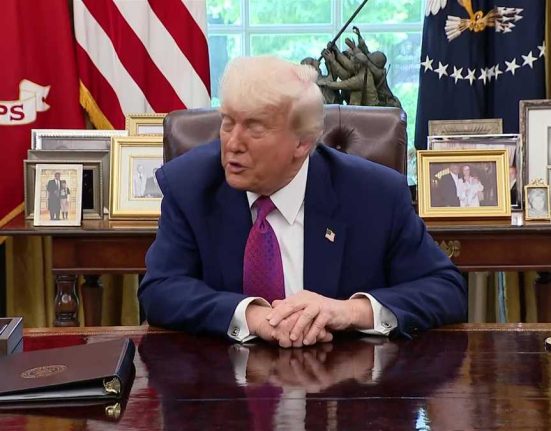The head of the White House’s budget office confirmed the Trump administration is considering taking unilateral action to withhold funding for federal agencies at the end of the fiscal year, despite lawmakers in both parties saying the move would be unlawful.
The White House is considering employing “pocket rescissions,” Office and Management and Budget Director Russ Vought said at a Senate hearing on Wednesday, a strategy that would enable spending to expire before agencies can allocate it. The administration is currently seeking to cancel $9 billion in previously approved funding, but the approach Vought confirmed is under consideration would provide an avenue to circumvent Congress if it votes against the package. It could also deploy the strategy for other funding not yet sent to Congress for a rescission.
“I would just say that we believe that we have, under the law, numerous options with regard to how to achieve savings, including rescissions that are timed at the end of the fiscal year,” Vought said.
The 1974 Impoundment Control Act allows the president to propose to rescind funding previously approved by Congress. Lawmakers have 45 days to consider the request and if they do not act to support the rescissions during that window, the request is denied. OMB can direct agencies not to spend the funding proposed for rescission for the entire 45-day period, regardless of when Congress acts.
Agencies must spend most of the appropriations they receive by Sept. 30, the end of the fiscal year. If the administration were to issue a rescission proposal in mid-August, the funding could be frozen until it expires. OMB under Trump, and while Vought was deputy director, began the process for a similar effort toward the end of fiscal years 2018 and 2019, but decided not to pursue it.
Asked if he would rule out such an approach this year, Vought declined.
“I’m not making that commitment,” Vought said. “I’m saying that no decision has been made with regard to any additional rescissions package or the timing of those rescissions package.”
The House earlier this month narrowly approved OMB’s $9.4 billion rescission package. It is now pending before the Senate and Vought appeared before the chamber’s Appropriations Committee on Wednesday to justify the request. It requires only a simple majority to pass, though some Republicans, including Sen. Susan Collins, R-Maine, who chairs the appropriations panel, expressed skepticism over the proposal.
Vought repeatedly told lawmakers OMB has yet to impound any funds, though the Government Accountability Office, which adjudicates the impoundment law, has twice found the administration violated the statute. Vought said he expected GAO to make many additional such findings and would not agree to spend the money the auditors have identified as improperly held up. The administration has “a lot of tools that are on the table for the purposes of those funds,” Vought said. He suggested the funding is merely being reviewed.
“We’re not ready here to say that we’re done with our programmatic review,” Vought said. “And GAO, quite frankly, is improper to continue to call it an impoundment.”
In 2018, GAO found the impoundment law’s legislative history, Supreme Court precedent and the constitutional framework of the legislative and executive branches “provide no basis to construe the ICA as a mechanism by which the president may, in effect, unilaterally shorten the availability of budget authority by transmitting rescission proposals shortly before amounts are due to expire.”
Then-GAO General Counsel Thomas Armstrong in that opinion added that “to dedicate such broad authority to the president would have required affirmative congressional action in legislation, not congressional silence.” He went on to say it would be an “abuse” of presidential power to place a new deadline on appropriations that differs from “the time period established by Congress in duly enacted appropriations legislation.”
Democrats throughout Wednesday’s hearing suggested that pocket rescissions were unlawful.
“The president does not have a line-item veto, much less a retroactive line-item veto,” said Sen. Patty Murray, D-Wash., the top Democrat on the appropriations panel.
Collins similarly told Politico last week she also thought the process was illegal.
Vought and other administration officials have said the ICA is itself unconstitutional and suggested they will seek to establish new precedent through the courts.







